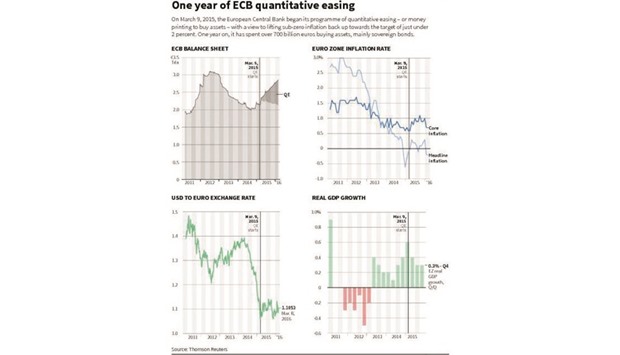Eurozone stocks yesterday failed to sustain a rally prompted by the ECB slashing interest rates as investors’ focus quickly shifted to the central bank’s gloomy economic forecasts instead.
Equities surged in an initial reaction to the ECB cutting its main interest rate to zero percent for the first time, and boosting the amount of stimulus it is pumping into the economy, with Paris and Milan rising more than 3% within minutes of the announcement, and Frankfurt by over 2%.
But they suffered a rapid downturn after the central bank cut its growth and inflation forecasts for the eurozone in 2016 and 2017.
“Mario Draghi confirmed his concerns about the worldwide slowdown,” said FXCM analyst Yoav Nizard.
Frankfurt was down 2.3% at the close, Paris plunged 1.7% and Milan ended 0.5% weaker.
Nizard said a further downward correction should be expected in coming sessions as ECB forecasts seemed to add grist to the mills of pessimists on the global economic outlook.
“Markets are beginning to wonder about the actions of central banks and about their capacity to save the world economy,” said Andrea Tueni, analyst at Saxo Bank.
Outside the eurozone, London’s FTSE index closed 1.8% down.
Wall Street followed European exchanges lower, following a stronger start.
Yet, analysts found little fault with the ECB’s stimulus package which adds immense firepower to measures already in place.
“Wow,” said Berenberg economist Holger Schmieding, “In almost every respect, the ECB went beyond expectations today.”
The euro slumped as low as $1.0822 after the ECB’s announcements, but bounced to $1.1174 as Draghi gave his growth forecasts at a news conference.
“This makes for a much more dramatic package than had been expected and (ECB chief Mario) Draghi got what he wanted,” said Russ Mould, investment director at trading firm AJ Bell.
He added: “Draghi has now set the stage for next week when central banks in Japan, the UK and US are all set to announce their latest interest rate decisions—and this is likely to have a huge say in whether share prices can beat off the fear of a bear market or not.”
The Frankfurt-based ECB said it is cutting its central “refi” refinancing rate to zero% from 0.05% previously.
At the same time, it lowered the rate on its marginal lending facility to 0.25% from 0.30% and on the deposit facility to minus 0.40% from minus 0.30%.
The bank also announced it would expand the volume of bonds it purchases each month under its programme of quantitative easing to €80bn from €60bn. And it would also start buying corporate bonds under the QE programme.
Previous moves announced by the ECB back in December had underwhelmed investors and were perceived by the financial markets as being half-hearted.
“Following the adverse reaction to December’s disappointment and in light of the growing downside risks to the recovery, the (ECB) Governing Council appears to have recognised the importance of not under-delivering again,” said economist Jonathan Loynes at research group Capital Economics.
“All told, the ECB deserves credit for learning from its mistake in December.”
Confidence across trading floors has been broadly upbeat this month after a recent rally that has seen equities, oil and high-yielding, or riskier, currencies make up some of the hefty losses suffered in January and February.
“But there is no guarantee that its latest ‘bazooka’ will be any more effective than previous ones in securing the strong and sustained growth required to eliminate the threat of deflation in the currency union, and allow the peripheral countries to tackle their debt problems,” said Loynes.

..
